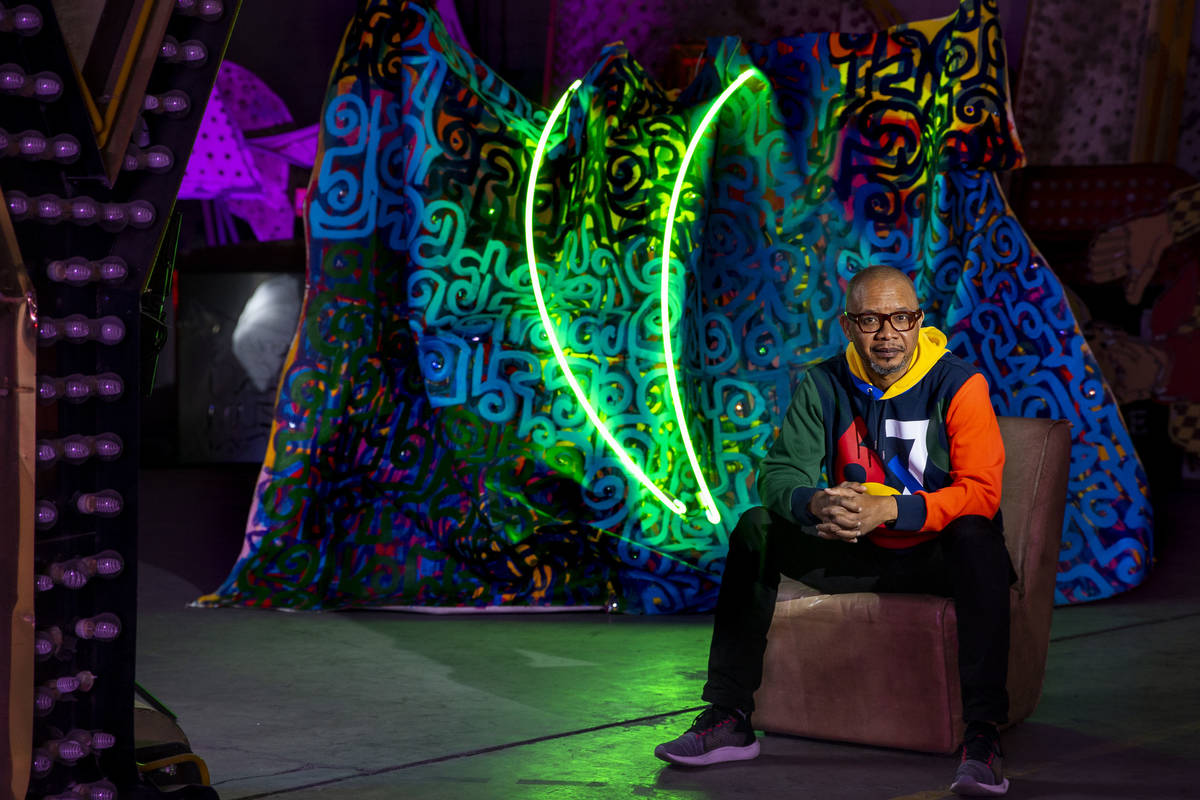International artist’s works reflect neon signs of a bygone era

When Nigerian-American artist Victor Ehikhamenor was selected as The Neon Museum’s 2020 National Artist in Residence, he didn’t know that the gig would involve a few firsts.
It was the first time the museum welcomed an artist in residence from outside the United States. It was the first time Ehikhamenor (Ay-HEEK-ha-min-or) used neon as an artistic medium.
And for both the artist and the museum, it was a first residency during a global pandemic.
But it all worked out well, generally speaking. While travel restrictions and public gathering limits did reduce the interaction Ehikhamenor had hoped to have with local artists and community members, the residency let him focus on art, rather than the touristy activities he is more used to doing here.
It also resulted in five works of art by Ehikhamenor that were inspired by The Neon Museum’s collection of historic signs. His pieces can be viewed in a virtual exhibit titled “What You Mean to Me” (neonmuseum.org/education/online-exhibitions/360-tour-of-air).
“In a short time, he managed to create really complex and very powerful pieces,” said Joanne Russ, Neon Museum arts program manager. One piece, a mixed media, canvas and neon installation called “Like Water God Riding His Dragon,” is to become part of the permanent collection.
Ehikhamenor began his residency virtually in late October, then arrived in Las Vegas the weekend of Nov. 7. He’s the fifth artist to participate in the residency program, which draws artists who have an interest in neon, the history of neon or the museum’s collection.
Ehikhamenor is an artist, writer and photographer whose work includes abstract, symbolic and politically oriented works. He also long has been intrigued by signs, symbols and language, and even once practiced the art of newspaper design.
His honors include a 2016 Rockefeller Foundation Bellagio fellowship; his art has been displayed in London and Washington, D.C.; and his fiction and critical essays have been published in The New York Times and The Washington Post.
The Neon Museum’s artist in residence program began in 2016, but Russ said Ehikhamenor, who returned to Nigeria on Dec. 17, is the first resident “who has, really, that kind of international experience.
“He has a great understanding of the United States and the political and cultural situation” here, Russ said. “But, then, he brings that wider reach.”
Ehikhamenor also is no stranger to Las Vegas. “I have a very good friend who has lived in Las Vegas since 2013,” he said, and he has visited here about once a year over the past several years. On those visits, Ehikhamenor did the usual sort of things visitors do.
However, the Neon Museum residency was “the first time I was exploring the art side of things,” he said. “I got to watch some of the artists and I met some of the writers. So this was a different ball game.”
Although the pandemic did limit face-to-face personal interaction during his stay, it also meant that “I didn’t have any distractions, because Las Vegas has so many things that can make you not stay in the studio for 24 hours,” he said. “In that sense, it was good. My going out was very limited, very restricted. So I kind of threw myself into work.”
Ehikhamenor’s art often incorporates traditional and folkloric elements and features iconography that resembles characters of an exotic alphabet. In a similar way, the three-dimensional, neon-infused pieces he created here hint at design elements that might be seen on signs in the museum’s collection.
The architects, artists and designers who created Las Vegas “had room to play,” Ehikhamenor said. For his pieces, he tried to reinterpret those examples of then-contemporary art.
“The Neon Museum helped me look at modern history and how I could create a contemporary (version) of that,” he said.
The residency also gave Ehikhamenor his first-ever chance to include neon in his work. He learned about fabricating neon signs at Hartlauer Signs. Learning how to bend glass tubes and create a neon palette of colors “was like chemistry lab or physics lab,” Ehikhamenor said.
When he presented master neon bender Oscar Gonzalez with the neon designs he had created for his pieces, Gonzalez “was so happy,” Ehikhamenor said. “He got to use colors of neon he hasn’t used yet. Nobody requested such colors.
“So it was eye-opening for me. This is the first time I worked with neon, but it’s not going to be the last time.”
Contact John Przybys at jprzybys@reviewjournal.com. Follow @JJPrzybys on Twitter.